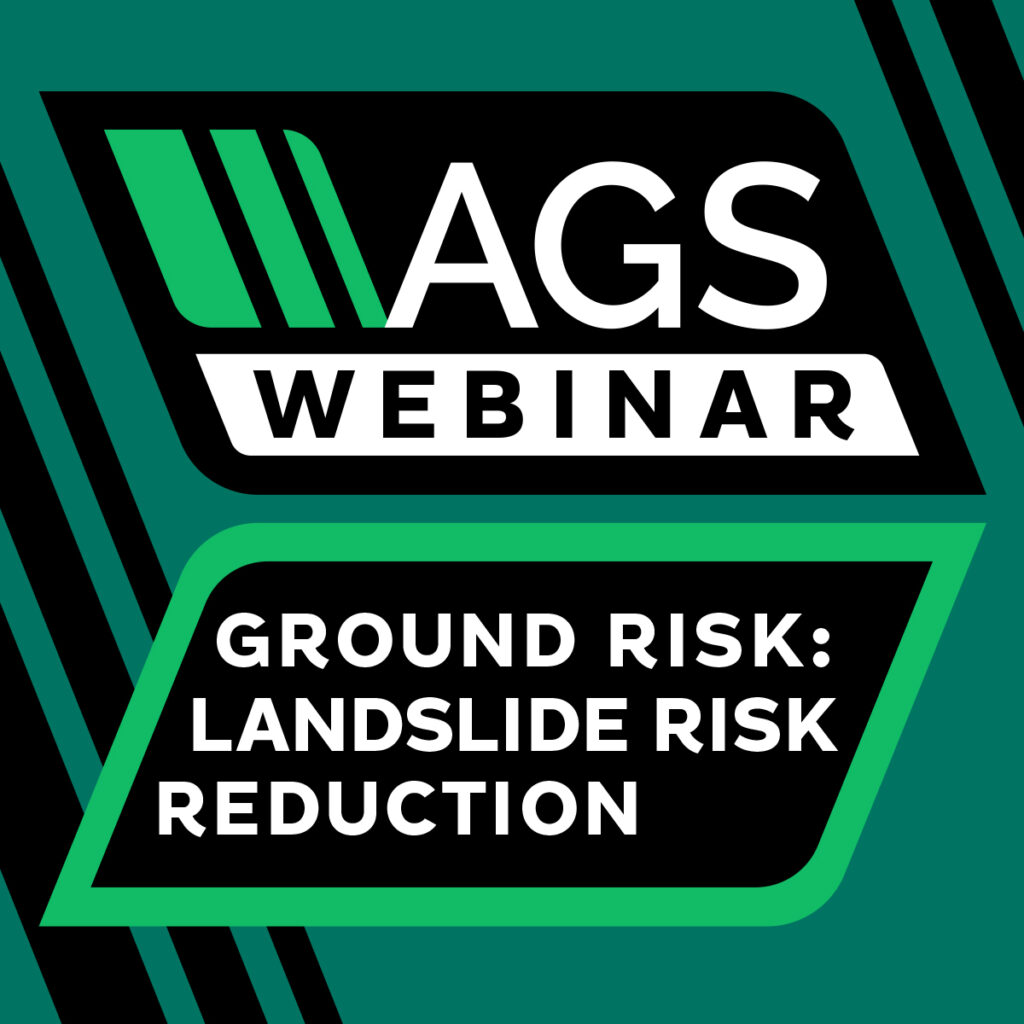This webinar from the Association of Geotechnical and Geoenvironmental Specialists will focus on ground risk, in particular landslide risk reduction.
The event, which is aimed at raising awareness of ground risks associated with slope instability, including landslides, will touch on risk assessment of landslide hazards, and explore the practical features to look for in the field. Speakers will also provide insights into the instrumentation and monitoring of slope movements.
This CPD virtual seminar is aimed at emerging and established geo-professionals who want to learn more about the performance of slopes, how to identify land instability hazards and assess the associated risks, and what can be done to monitor and mitigate the impacts. The event will be of interest to those in the ground engineering sector who deal with the mitigation of ground instability risks and those in the profession who wish to learn more about landslide risk identification, assessment and impacts.
To view the event programme click HERE.
PRESENTATIONS
Landslide Risks to Road Users, Road Infrastructure and Socio-economic Activity
Presented by Professor Mike Winter, Director at Winter Associates Limited
Fast-moving, rainfall-induced debris flow events are relatively common in the mountainous areas of the UK. Their impacts encompass the economic and social as well as the physical risk to infrastructure and people. The assessment of such landslide hazards and risks forms an essential precursor to landslide risk reduction whether via management and mitigation. This is particularly the case when an authority is responsible for an infrastructure or building portfolio that may be affected by multiple hazards and/or hazard types.
Debris flows often sever (or delay) access to and from relatively remote communities for services and markets for goods; employment, health and educational opportunities; and social activities.
Semi-quantitative risk assessment, at the regional scale, and quantitative risk assessment, at the site scale, of the risks that debris flow hazards pose to road users will be described. Specific risks include road user fatality, road infrastructure damage and the socio-economic activities that road networks facilitate. Economic impacts will be quantified and the way in which their extent can be defined by the vulnerability shadow will be described along with emerging approaches to understanding infrastructure vulnerability.
If time allows, the effects of climate change on debris flow hazard and risk will also be considered in the context of likely changes to hazard frequency and/or magnitude and changes to risk.
A strategic approach to risk reduction allows a clear focus on the overall goal of risk reduction before homing in on the desired outcomes and the generic approach to achieving those outcomes.
Landslide Risk Reduction
Presented by Ian Nettleton, Technical Director at Coffey Geotechnics Limited, A Tetra Tech Company
Landslide risk reduction in areas with difficult access, high relief and complex terrain can be challenging, especially for extensive infrastructure networks, with competing demands on resources.
The key elements to successful risk reduction typically include the appraisal of landslide susceptibility; assessment of the hazard; and assessment of risk. These elements enable the need for risk reduction to be identified and quantified. This enables multiple landslide hazards, or other geohazards, to be appropriately prioritised for action and allocation of resources.
For the appraisal of landslide susceptibility, the approaches adopted, and their implementation, by major UK asset owners will be discussed.
For landslide hazard and risk assessment the determination of the type and extent of failure; the likely level of damage; and the temporal component are critical to enable informed risk reduction. The identification and interpretation of key site evidence is critical to enable appropriate and representative characterisation to be undertaken, and case examples will be presented.
Such hazard and risk assessment can then be used to determine the necessary and desirable actions to reduce that risk in the form of mitigation or management. Examples will be given of these along with some pitfalls to be wary of.
Instrumentation for Monitoring the Performance of Clay Slopes
Presented by Dr Andrew Ridley, Managing Director at Geotechnical Observations Limited
Infrastructure embankments and cuttings are used to afford the passage of roads, railways, rivers and canals with a minimal need for changes in vertical alignment. In the cases of canals and railways in particular many of these earth structures were constructed before the development of modern soil mechanics. The change in condition of the materials used to construct them and their progressive deformation has a critical effect on their long-term serviceability and stability.
Finite element analyses show that the long-term stability of cuttings formed of plastic clays is influenced by gradual and slow swelling promoted by increasing pore water pressures that are initially decreased to negative values during excavation to form the slopes. Analyses also indicate that seasonal cyclic stress changes brought on by fluctuating pore water pressures cause plastic strains that can eventually lead to instability in embankments formed of plastic clays. If analyses such as these are to be used to assess the serviceability and stability of clay slopes (old and new) it is essential that they be fed with good monitoring data. This talk will present field measurements gathered during the last 20 years and describe how they were made.
SPONSORS
RST Instruments
Structural Soils
Structural Soils Ltd has evolved into an award winning national, multidisciplinary, integrated geotechnical and geoenvironmental site-investigation company with the proven capability, capacity and confidence to undertake contracts of any size, in any location and virtually any scope. In 2020, we won ‘The Big 3’ GE awards, Ground Investigation Specialist of the year, Contractor of the Year, Ground Investigation Project of the Year.
For more information please visit www.soils.co.uk or contact us at ask@soils.co.uk
Geotechnical Engineering
Geotechnical Engineering Ltd is the UK’s largest privately-owned site investigation contractor, renowned for innovative ground investigation and pre-construction surveys. Established in 1961, this year marks the 60th anniversary of the companies creation.
Speakers

AGS Chair Elect and Regional Manager & Associate at Coffey Geotechnics Limited, A Tetra Tech Company
Sally has 30 years’ experience in the ground engineering industry and has responsibility for the delivery and management of geotechnical risk on a wide range of projects.
She has worked in the site investigation field for specialist contractors and for design consultancies on many major transport and energy infrastructure schemes, on earthworks design schemes and asset management in the road, rail and energy sectors.
Sally has more recently concentrated on business development and technical management of geotechnical operations within Coffey in the UK and has been the AGS Business Practice Working Group Leader since 2019.

Director at Winter Associates Limited
Mike is Director of Winter Associates Limited, the company that he started in 2019 after 30 years in applied research and specialist consultancy at TRL.
His areas of expertise include landslides and their hazard and risk assessment, and management and mitigation; soil materials, compaction and earthworking; and the use of waste materials in geo-structures. His work has been widely-adopted in teaching and practice from his near-300 publications.
Former Chief Scientific Editor of QJEGH, he led the organisation of XVI ECSMGE, the largest UK Civil Engineering event, and Executive Member of the ISSMGE TC202 on Transportation Geotechnics. He is Visiting Industrial Professor of Engineering Geology and Geotechnics at the University of Portsmouth, and Visiting Professor in the UNESCO-Chair Programme on Geoenvironmental Disaster Reduction at Shimane University, Matsue, Japan.
Mike has lectured and worked in 35 countries and on each of the world’s continents, with the major exception of Antarctica – in this respect Mike remains open to offers.

Technical Director at Coffey Geotechnics Limited, A Tetra Tech Company
Ian is a Technical Director at Coffey Geotechnics Ltd with 30 years of experience in consultancy and applied research in engineering geology and geotechnics. He is currently head of Coffey’s Engineering Geology team in the UK.
Ian’s areas of expertise include rock & soil slope design, inspection, risk assessment / management and remediation; landslide & slope failure investigation and remediation; digital terrain model hazard assessment; rock mass characterisation; and research & development projects.
He has a track record of investigating geotechnical and related problems and failures, frequently in emergency call-out situations. This has led to him being called upon by Transport Scotland, Highways England, Network Rail, Forestry Commission and Parks Canada to undertake peer reviews and investigations of major landslides; the development of risk assessment systems for landslides and rockfall; and to provide input into the development of infrastructure management procedures.
He has published more than 30 papers / publications on these topics and is a Member of Technical Committee of ISSMGE: TC 208 Slope Stability in Engineering Practice. He has extensive UK and international experience including Australia, Canada, Oman, Morocco, Dubai, Iraq (Kurdistan), Kyrgyzstan, Saudi Arabia and Libya.

Managing Director at Geotechnical Observations Limited
Andrew Ridley is the Managing Director of Geotechnical Observations Ltd (GeO), which he founded in 2000. GeO specialise in the installation, reading, reporting and interpretation of geotechnical instrumentation.
Andrew obtained his first degree in Civil Engineering from the University of Nottingham in 1984, followed it with a Master’s Degree in Soil Mechanics from Imperial College London in 1988 and was awarded a PhD by Imperial College in 1993 for his work on “the measurement of soil moisture suction.”
He has served on the Editorial Panel of Geotechnical Engineering (the proceedings of the ICE), the Editorial Panel of Géotechnique for the 2011 Symposium in Print on Partial Saturation in Compacted Soils, the Steering Committee for CIRIA 550 Infrastructure Embankments – Condition Appraisal and Remedial Treatment and represents FMGM (Field Measurements in Geomechanics) on the BGA (British Geotechnical Association) committee. He is also the UK representative on ISO/TC182/WG2, which is drafting International Standards for geotechnical instrumentation and monitoring and is Chair of ISSMGE TC220 on Field Measurements in Geomechanics.
In 2016 he was awarded the John Mitchell Gold Medal by the Institution of Civil Engineers in recognition of his contributions to geotechnical engineering.

LEAD SPONSOR:

Price: £30.00
AGS Member: £25.00 all prices exclude VAT
Price: £30.00
AGS Member: £25.00 all prices exclude VAT